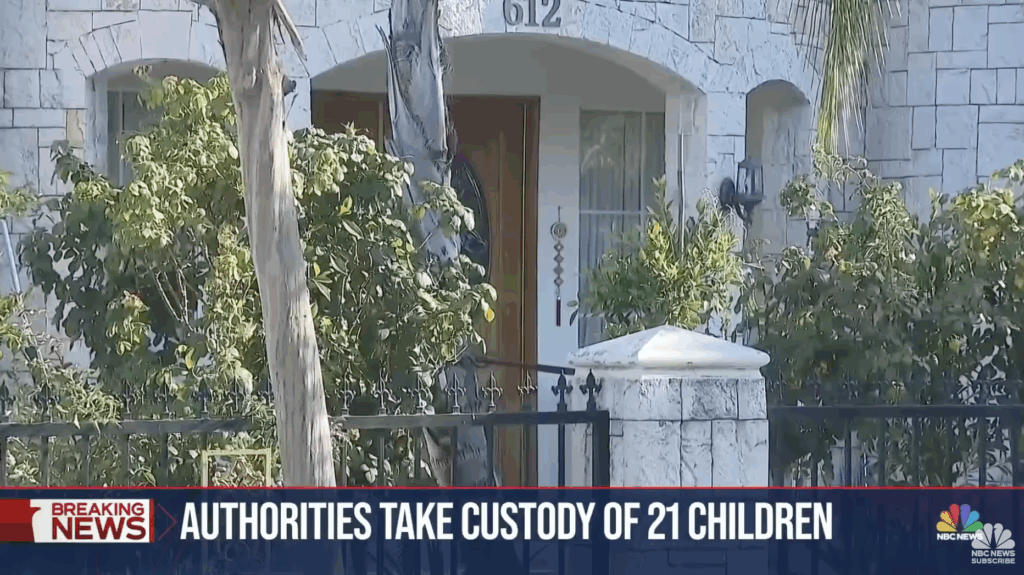In a troubling case unfolding in California, police have removed 21 children from a couple with connections to China. This complicated situation highlights profound ethical, moral, and legal dilemmas that demand attention.
Explainer Immigrants Create 21 Children Via Surrogate Before Allegedly Abusing Them
The couple at the center of this case is Silvia Zhang, 38, and Guojun Xuan, 65. Originally from China, they became naturalized U.S. citizens and now reside in a sprawling multimillion-dollar mansion in a suburb of Los Angeles. Zhang has a daughter from a previous marriage. She and Xuan have been having children through surrogacy since 2021.
Zhang operated a surrogacy agency called Mark Surrogacy from their mansion. The agency purportedly marketed itself as an institution assisting American and international couples struggling to conceive through surrogacy. However, investigations revealed a startling truth: The only couple the agency served was Zhang and Xuan themselves. They are the biological parents of 21 children born through surrogacy. Of these children, fifteen lived with them in the mansion under the care of a few nannies, while friends and family supposedly looked after the other six in different locations.
Mark Surrogacy’s operation would have continued if not for one of the children, a two-month-old infant, who had to be rushed to the hospital in May. After hospital staff determined the infant exhibited signs of child abuse, they contacted social services and the police. Police searched Zhang and Xuan’s mansion and found 15 children, none of whom is more than three years old. The police also uncovered home surveillance videos showing that some children were “subjected to physical and emotional abuse” by their nannies. Therefore, the police removed all children and put them under foster care.
The revelations surrounding Mark Surrogacy have left many of the surrogate mothers in disbelief and anger. “It was kind of like they preyed on my vulnerability, being a first-time surrogate,” Kayla Elliott told CBS News. “We were lied to about so much, that I mean it’s disgusting.”
Compounding this injustice is the fact that two surrogate mothers are currently pregnant with the couple’s children, unsure if their babies will be placed into the foster care system. Some of these mothers are contemplating legal action against Zhang and Xuan. Additionally, the couple is entangled in two lawsuits from former employees of their real estate business, raising further questions about their integrity.
In May, Zhang and Xuan were arrested on allegations of felony child endangerment and neglect. Despite this, they were not charged and were subsequently released on bond. In an interview with the Wall Street Journal, Zhang defended their actions, arguing that having “as many children as possible” is not illegal. Zhang strongly refuted claims of any human trafficking motives, instead highlighting her lifestyle as proof of her capability to support a big family.
The situation of Zhang and Xuan raises many questions from immigration to the ethics of surrogacy. Philip Lenczycki, an investigative reporter at the Daily Caller, reported that Xuan has held multiple Chinese government positions in Xinjiang, where the Chinese Communist Party (CCP) has been systemically persecuting Uyghur Muslims and other ethnic minorities. The U.S. government has deemed the CCP’s repression in Xinjiang a “genocide,” and has sanctioned several organizations and officials associated with Xinjiang.
Xuan reportedly served as a representative to the Urumqi Municipal People’s Congress and Xinjiang Uyghur Autonomous Region (XUAR) People’s Congress between 1997 and 2012. Since both legislative bodies were responsible for passing some repressive legislation against Uyghurs, a Uyghur activist stated that “anyone who served in the so-called Urumqi or Xinjiang People’s Congresses between 1997 and 2012 was fully complicit in genocide.”
It is crucial to highlight that Xuan must be a member of the CCP to serve on the People’s Congress. U.S. immigration law prohibits immigrants with “membership in or affiliation with the Communist or any other totalitarian party” from becoming naturalized citizens. Thus, it is curious how Xuan, a high-ranking CCP member linked to genocide in Xinjiang, was able to obtain U.S. citizenship. This situation highlights serious enforcement issues in immigration laws and warrants investigation.
In addition to child welfare concerns, the case highlights the ethical, legal, and moral dilemmas surrounding the commercial surrogacy industry. Surrogacy is illegal in many countries, including China, but the United States has no federal restrictions. Commercial surrogacy is legal in most states, including California. This legal landscape, along with birthright citizenship, makes the U.S. a popular destination for international surrogacy.
Regardless of Zhang and Xuan’s motivations, their troubling case forces a confrontation with important issues and demands answers to uncomfortable questions. It is essential to strengthen the immigration system to prevent exploitation by individuals associated with the CCP. The reported abuse in Zhang and Xuan’s home reveals a disturbing truth: Wealth alone does not guarantee adequate caregiving. Moreover, no rationale can justify the actions of a wealthy couple who mislead multiple women into bearing their embryos in their pursuit of an ideal family size.
Why it matters
- 21 children removed from a couple linked to China raises serious child welfare concerns and ethical dilemmas in surrogacy.
- The couple's alleged abuse and exploitation of surrogate mothers highlight systemic issues in the surrogacy industry.
- Xuan's past as a CCP member raises questions about immigration enforcement and the integrity of U.S. citizenship processes.
What’s next
- Investigations into Zhang and Xuan's surrogacy practices and potential legal actions by surrogate mothers are ongoing.
- Calls for stricter regulations on surrogacy and immigration laws are expected to intensify in light of this case.
